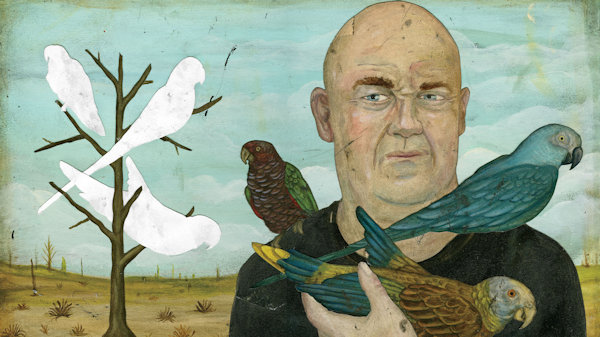SEJournal Online is the digital news magazine of the Society of Environmental Journalists. Learn more about SEJournal Online, including submission, subscription and advertising information.
 |
| Depiction of “Parrot King” Martin Guth for Borrell’s prize-winning story. Illustration: Jason Holley. |
Inside Story: Reporter Navigates Ethical Questions in Project on Endangered Species, Free Markets
Could private actors and the free market serve as the best route for conservation? That was one of the questions raised by Brendan Borrell in “The Parrot King,” his investigation for Audubon Magazine into an influential breeder of rare wild parrots, a report that took first-place honors for outstanding feature story (small market) in the Society of Environmental Journalists’ 20th Annual Awards for Reporting on the Environment. Borrell explored the removal of highly endangered parrots in the small island nation of Dominica in the Caribbean, and their relocation to an exclusive zoo in Berlin. His reporting posed several risks and challenges, including the navigation of privacy laws in Germany and Europe, and a journalistic ethical dilemma of his own.
SEJournal Online recently caught up with Borrell and asked him about the many speed bumps he encountered as he reported on the conservation of wild parrots. Here is the conversation.
SEJournal: How did you get your winning story idea?
Brendan Borrell: I was in that between-story funk and was going back through my file of half-baked story ideas, and I reached out to one of my sources who told me about a group of highly endangered parrots that had been taken off the island of Dominica and kept at an exclusive zoo in Berlin.
SEJournal: What was the biggest challenge in reporting the piece and how did you solve that challenge?
Borrell: The parrot business can be quite secretive, and many sources I reached out to were fearful of speaking about Martin Guth, who ran the Association for the Conservation of Threatened Parrots, or ACTP. I had to work hard to separate fact from rumor. Guth initially agreed to an in-person interview but began putting restrictions on it when I arrived in Berlin, which eventually led to legal threats.
‘I still think [Guth] sincerely wants to
protect wild parrots. I'm not saying
he was going about it in the right
way, but people are complicated.’
SEJournal: What most surprised you about your findings?
Borrell: Despite Guth's bluster and his tactics, I still think he sincerely wants to protect wild parrots. I'm not saying he was going about it in the right way, but people are complicated.
SEJournal: How did you decide to tell the story and why?
Borrell: ACTP had at this point taken control of more than 90% of the world's remaining Spix's Macaws, among other highly endangered birds, and I felt it was critical to examine their leadership and prospect for success. More generally, the conservation world has long been divided by those who believe that private actors and the free market can contribute to species preservation and those who are appalled by it. ACTP was a test case.
SEJournal: Does the issue covered in your story have disproportional impact on people of low income, or people with a particular ethnic or racial background? What efforts, if any, did you make to include perspectives of people who may feel that journalists have left them out of public conversation over the years?
Borrell: ACTP was able to succeed because Guth and his cadre of wealthy collectors were willing to go into underresourced countries and make promises of funding and supplies in exchange for access to parrots. I spoke to resource managers in these countries to understand the tough decisions they had to make when they were operating on a shoestring budget.
SEJournal: What would you do differently now, if anything, in reporting or telling the story and why?
Borrell: This story posed some of the most intense ethical challenges I ever faced, and I know some might be critical of my decision to go forward with reporting under the restrictions Guth wanted me to agree to before entering ACTP's zoo. I replay our hours-long standoff in my head quite often, but I come away thinking I made the right choice because of the amount of information I was able to acquire by going forward with my visit.
 |
| Brendan Borrell |
SEJournal: What lessons have you learned from your story?
Borrell: When I began this project, I learned that The Guardian newspaper was also preparing to publish its own investigation of ACTP. Rather than giving up at that point, I was able to build off its excellent work and find my own way into the story. It's easy to get discouraged about being scooped but it isn't always a bad thing.
SEJournal: What practical advice would you give to other reporters pursuing similar projects, including any specific techniques or tools you used and could tell us more about?
Borrell: As I learned the hard way, navigating privacy laws in Germany and other European countries can be quite complicated. I would recommend that anyone planning an international investigation consult with lawyers or media experts in those countries.
SEJournal: Could you characterize the resources that went into producing your prize-winning reporting (estimated costs, i.e., legal, travel or other; or estimated hours spent to produce)? Did you receive any grants or fellowships to support it?
Borrell: In addition to the travel to Germany paid for by Audubon, the biggest drain on resources came from our consultations with multiple lawyers in the U.S. and Germany.
SEJournal: Is there anything else you would like to share about this story or environmental journalism that wasn’t captured above?
Borrell: Be persistent and be patient. These stories take a long time to come to fruition.
Brendan Borrell is an award-winning journalist and the author of “The First Shots: The Epic Rivalries and the Heroic Science Behind the Race to the Coronavirus Vaccine,” which tells the inside story of Operation Warp Speed. He lives in Los Angeles.
* From the weekly news magazine SEJournal Online, Vol. 7, No. 30. Content from each new issue of SEJournal Online is available to the public via the SEJournal Online main page. Subscribe to the e-newsletter here. And see past issues of the SEJournal archived here.













 Advertisement
Advertisement 



